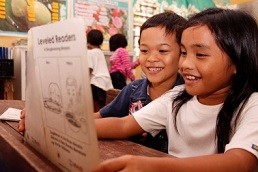Speeches Shim

To support broad-based and inclusive growth, USAID works with partners to improve the quality of both basic and higher education across the country. USAID invests in the next generation’s ability to sustain growth by improving early-grade reading skills, strengthening education governance at the community, helping universities align research and curricula with industry demands, and strengthening the science, technology and innovation ecosystem.
In support of its goal of fostering peace and stability, USAID is also active in providing education, economic and leadership opportunities to vulnerable out-of-school youth in conflict-affected areas in Mindanao. USAID is strengthening the capacity of stakeholders such as local governments, civil society, and the private sector to deliver education and training so that youth may return to school, join the workforce, or start their own business. Leadership and civic engagement training also builds social connections and trust to make youth more resilient in the face of recruitment of violent extremist groups.
In addition, USAID involves youth in governance processes, civil society strengthening, community participation and programs that counter radicalization and violent extremism. USAID identifies and supports next-generation leaders who will demand accountability from government leaders and become empowered members of their communities. USAID supports peace-building in Mindanao through learning camps and youth exchanges.
PROJECTS
ABC+ (Advancing Basic Education in the Philippines)
Improving education outcomes for all children and youth remains a core challenge for the Philippine basic education system. At the root of the problem are the poor reading and math skills of many Filipino students, particularly in the early grades. The ABC+ project helps Department of Education and education stakeholders to address the interconnected factors that contribute to low education outcomes in poorest performing areas of the Philippines. This project identifies innovative and sustainable ideas on how to address the continuing challenges in literacy, numeracy and socio-emotional learning for children in the Philippines, with a particular focus on systems strengthening.
Education Governance Effectiveness (EdGE)
Poor education governance constraints effective delivery of basic education services. EdGE addresses this by building the capacity of stakeholders to advocate for local level policy reforms in education. Since its inception, more than 9,000 school administrators and local government officials from 91 cities and municipalities nationwide have been trained on fiscal management and utilization of local education funds. Local education reform champions have also been mobilized through membership in Local School Boards and School Governing Councils. EdGE is also part of the “Marawi Women’s Voices for Peace” program, which addresses distinct, urgent needs of displaced women and girls by securing their rights and inclusion and will implement measures to bring displaced girls back to school in host-communities.
Gabay (Strengthening Inclusive Education for Blind, Deaf and Deafblind Children)
The Advisory Council for the Education of Children and Youth with Disabilities estimated at least 13 percent or 5.49 million Filipino children have special needs, of which 2 million are with disabilities. Though efforts to improve the system and increase the number of Deped SPED resource centers are being undertaken, less than five percent of children with disabilities are actually in school. To address this, the three-year Gabay project will strengthen Inclusive Education Community Resource Centers, and support the improvement of detection, instruction, and assistance for children with hearing and vision impairments.
Science, Technology, Research and Innovation for Development (STRIDE)
USAID launched STRIDE to strengthen the Philippines’ capacity for innovation-led, inclusive economic growth. The project focuses on disciplines that contribute to high-growth sectors, including electronics, chemical industries, alternative energy, agribusiness and information technology, with cross-cutting themes of manufacturing and new product development. STRIDE is creating a dynamic network of researchers in universities and industry who continuously innovate; entrepreneurs and investors who turn discoveries into products and companies; and a government supportive of initiatives that enable these partnerships to flourish.. Since 2013, STRIDE has established working partnerships with over 200 industry partners, 110 Philippine academic institutions, and 25 U.S. universities It has awarded 68 research grants valued at over $5 million, 57 scholarships to Filipinos to study in U.S. universities; provided advanced technical training to scientists and researchers; brought in 34 U.S. visiting professors; and established knowledge and technology transfer offices and career centers in 40 universities in the Philippines.
YouthWorks PH
With over 50 percent of its population under 30 years of age, the Philippine “youth bulge" is both a tremendous challenge and a great opportunity. However, despite the rapid gains in the Philippine economy, one in four young people aged 15-24 are not in education, employment or training, with youth accounting for almost half of the unemployed, and more than a third of the country's unemployed youth having at least some level of college education. This indicates a major mismatch between education and job opportunities. YouthWorks PH is a five-year partnership between USAID and the Philippine Business for Education that engages and mobilizes the private sector to address the education needs of youth, as well as the skill requirements of employers. This partnership will improve access to training and employment opportunities for at least 40,000 youth through an innovative work-based training approach. This approach allows youth to earn a competency certificate from a university or training institute, while working in partner companies.
All Children Reading (ACR)-Philippines
The National Achievement Test, the Philippines’ measure of education quality, remains below the targeted mean percentage scores. The government has identified poor reading skills of Filipino students, particularly in the early grades, as the cause of the problem. The two-year ACR project seeks to support reading outcomes for primary learners, with a focus on increasing impact, scale and sustainability. This activity builds on the capacity of the Department of Education to support high impact early grade reading programs through evidence-based actionable research. USAID assistance includes conduct of the National Early Grade Reading Assessments (EGRA); four separate language studies in Mindanao, and Educational Exchanges. This activity also supports education exchanges, ICT for education research and capacity building activities for monitoring and evaluation.


Comment
Make a general inquiry or suggest an improvement.